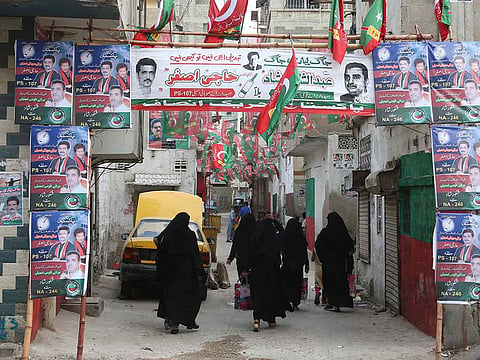Understanding Pakistan general elections 2018 in numbers
Pakistan goes to the general elections on July 25 with 12,570 candidates running for 849 general seats

Dubai: Pakistan goes to the general elections on July 25 for a total number of directly elected 849 seats including 272 seats for the national assembly.
A total number of 12,570 candidates will running for the 849 general seats of Pakistan's national and four provincial assemblies.
Among these are 3,459 candidates — 1,623 from Punjab, 824 from Sindh, 725 from Khyber Pakhtunkhwa and 287 from Balochistan. They will contest for the 272 general seats of the National Assembly. The National Assembly – the lower house of the parliament in the Pakistan’s democratic system consists of 342 members, of which 272 are directly elected, 60 seats are reserved for women and 10 are open to religious minorities. A political party needs at least 172 seats of simple majority to form a government the national level and has the right to select a prime minister.
Motorists drive along a road with posters of candidates taking part in the forthcoming general elections, in the garrison city of Rawalpindi. AFP
Elections will also be held simultaneously in the four provinces of Pakistan -- Punjab, Sindah, Balochistan and Khyber Pakhtunkhwa – to elect members for the provincial assemblies to form governments at the provincial level.
According to the Election Commission of Pakistan, a total of 8,396 are running for 577 general seats of the four provincial assemblies.
The figures show marked decrease in the number of candidates contesting elections this time compared to the 2013 general elections when a total of 15,629 candidates — 4,671 for National Assembly and 10,958 for provincial assemblies — ran in the race to form government.
In Punjab, a total of 4,036 candidates will contest for 297 general seats of the Punjab Assembly whereas 2,252 candidates are competing for 130 general seats of the Sindh Assembly. Some 1,165 candidates will vie for 99 seats in the Khyber Pakhtunkhwa and 943 are competing for 51 general seats of the Balochistan Assembly.
A street is decorated with posters of election candidates in Karachi. AP
According to the Election Commission of Pakistan, a total of 105.96 million voters out of total population of about 200 million people are included in the electoral roll to cast vote in elections on July 25, 2018. They include: 59.22million male and 46.73million females, with the gender gap between male and female rising to around 12.5m. This shows that 55.9 per cent of the registered voters in Pakistan are males while only 44.1pc are females.
The numbers are approximately 23 per cent higher than the figures for the 2013 elections when the total number of voters stood at 86.19m. It means that this time more than 19 million additional voters are registered for this elections.
Pakistan Elections 2018
■ Total number of seats: 849 (including national assembly and four provincial assemblies)
■ Total number of candidates: 11,855
■ Number of political parties taking part: 107
■ Number of National Assembly seats: 342 (272 directly elected, 60 reserved for women and 10 for religious minorities)
■ Number of candidates contesting for National Assembly: 3,459
■ From Punjab:1,623
■ From Sindh: 824
■ From KPK: 725
■ From Balochistan: 287
Election in four provincial assemblies in four provinces of Pakistan
Punjab Assembly:
■ Number of candidates: 4,036
■ Number of general seats to contest: 297
Sindh Assembly:
■ Number of candidates: 2,252
■ Number of general seats to contest: 130
Khyber Pakhtunkhwa:
■ Number of candidates: 1,165
■ Number of general seats to contest: 99
Balochistan Assembly:
■ Number of candidates: 943
■ Number of general seats to contest: 51
Electoral roll
• Population of Pakistan: 200 million (last estimate)
• Total number of voters: 105.96 million
• Number of voters in 2013 elections: 86.19 million
• New voters in 2018: 19.77 million
• Male: 59.22million (5.9 per cent)
• Female: 46.73million (44.1 per cent)
• Gender gap between male and female voters rising to around 12.5million.
• Number of voters in Punjab: 60.67million
• Male: 33.68million
• Female: 26.99million
• Number of voters in Sindh: 22.39million
• Male: 12.44million
• Female: 9.95million
• Number of voters in Khyber Pakhtunkhwa: 15.32m
• Male: 8.71million
• Female: 6.61million
• Number of voters in Balochistan: 4.3million
• Male: 2.49million
• Female: 1.81million
• Number of voters in Federally Administered Tribal Areas (FATA): 2.51million



